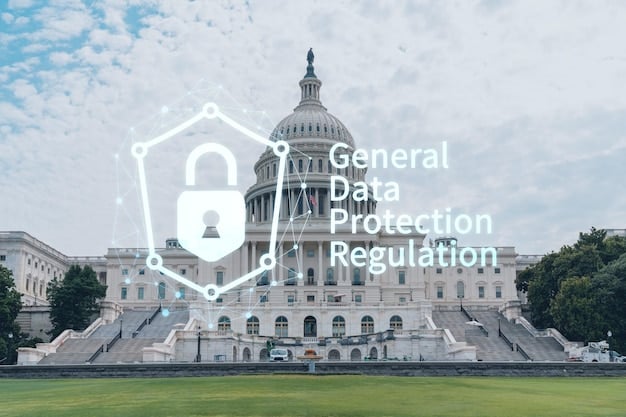New Data Privacy Regulations in 2025: A US Guide

Anúncios
New Federal Regulations on Data Privacy in 2025 bring significant changes to how personal data is handled in the US, impacting businesses and individuals with enhanced rights and stricter compliance requirements.
The landscape of data privacy is ever-evolving, and 2025 promises to be a pivotal year. The introduction of New Federal Regulations on Data Privacy: What the Latest Changes Mean for You in 2025 will reshape how personal information is collected, processed, and protected across the United States. It’s essential to understand these changes to ensure compliance and safeguard your digital rights.
Understanding the Impetus Behind New Federal Data Privacy Regulations
The drive for enhanced data privacy regulations stems from a growing public concern about the collection, use, and security of personal information. Several high-profile data breaches and the increasing complexity of digital technologies have highlighted the need for a comprehensive federal framework to protect individuals’ rights. This section delves into the key factors that have influenced the development of these regulations.
The Rising Tide of Data Breaches
Data breaches have become increasingly common, exposing sensitive personal information to malicious actors. These incidents have eroded public trust and underscored the need for robust security measures and clear accountability. The frequency and severity of these breaches have pushed lawmakers to prioritize data protection.
Anúncios
Several key factors have spurred the need for these new regulations. First, increased public awareness regarding data privacy has grown, accelerated by frequent news reports of data breaches and misuse of personal information. Second, technological advancements enable more sophisticated data collection and analysis methods.
Global Influence and the Need for Harmonization
The European Union’s General Data Protection Regulation (GDPR) has set a high standard for data privacy globally. The United States, lacking a comprehensive federal law, has faced pressure to harmonize its regulations with international norms to facilitate cross-border data flows and maintain competitiveness in the global market. Some states, like California with the CCPA, have taken the lead, further underscoring the need for federal action. Considering these points, it is evident as to why the new set of data privacy regulations are being put in place.
- The European Union’s GDPR has become a global standard for data protection.
- Many businesses operate internationally, and GDPR impacts data protection standards on a global level.
- US businesses need to align with global standards to remain competitive.
In conclusion, a multitude of factors is driving the creation of new federal data privacy regulations. Addressing individual privacy concerns is a primary concern, as well as the need to create a more level playing field for the US in the international market.

Key Provisions of the New Federal Regulations on Data Privacy
The New Federal Regulations on Data Privacy: What the Latest Changes Mean for You in 2025 are designed to provide individuals with greater control over their personal data and impose stricter requirements on businesses that collect and process such information. This section provides an overview of the key provisions that you need to be aware of.
Enhanced Individual Rights
These regulations will grant individuals several new rights, including the right to access, correct, and delete their personal data. Additionally, individuals will have the right to opt out of the sale of their data and the right to data portability, allowing them to transfer their data from one service provider to another.
Individuals gain more authority over how their information is used. These enhancements can include the right to know, the right to correct, and the right to erasure.
Stricter Obligations for Businesses
Businesses will face stricter obligations regarding data collection, use, and security. They will be required to obtain explicit consent from individuals before collecting or processing their data, implement reasonable security measures to protect data from unauthorized access, and provide clear and transparent information about their data practices.
Data Minimization
Data minimization is the idea of limiting the collection of personal data to what is directly relevant and necessary for a specified purpose. This principle aims to reduce the amount of personal information held by businesses, thereby decreasing the risk of breaches and unauthorized use.
- Collect only the data that is relevant for identified reasons.
- Limit retention periods.
- Implement strong data governance policies.
The enactment of these regulations will bring about a new legal framework for how data is managed and processed in business settings. These key provisions establish a foundation for how data should be handled.
Impact on Businesses Operating in the US
The introduction of the new federal data privacy regulations will have a significant impact on businesses operating in the US. Companies of all sizes will need to reassess their data practices, implement new compliance measures, and adapt their business models to align with the new legal framework. Failure to comply with these regulations could result in substantial penalties and reputational damage.
Compliance Challenges and Costs
Businesses will face several challenges in complying with the new regulations. Implementing robust security measures, obtaining explicit consent from individuals, and providing clear and transparent information about data practices will require significant investments in technology, personnel, and training. Small and medium-sized enterprises (SMEs) may find it particularly challenging to meet these requirements due to limited resources.
These new regulations could potentially impact businesses both large and small. They will need to build new tech infrastructure and will need to re-train personnel.
Opportunities for Competitive Advantage
While compliance may pose challenges, it also presents opportunities for businesses to gain a competitive advantage. Companies that prioritize data privacy and build trust with their customers can differentiate themselves from competitors and attract privacy-conscious consumers. Transparency and ethical data practices can become key differentiators in the market.
Building a Privacy-First Culture
To truly thrive in the new regulatory environment, businesses need to foster a privacy-first culture within their organizations. This involves training employees on data privacy best practices, implementing robust data governance policies, and establishing clear lines of accountability. A strong privacy culture can help businesses avoid costly mistakes and build lasting relationships with their customers.
- Implement strong data governance policies.
- Commit to transparency in data handling.
- Make privacy a factor in business decisions.
Overall, the businesses that take the new rules surrounding data privacy seriously are more than likely to succeed and retain customer trust.
How Individuals Can Benefit from These Regulations
The new federal data privacy regulations are designed to empower individuals and provide them with greater control over their personal data. By exercising their rights under these regulations, individuals can protect their privacy, reduce the risk of identity theft, and make more informed decisions about their online activities. This section explores the various ways in which individuals can benefit from these new protections.
Exercising Your Rights to Access, Correct, and Delete Data
One of the key benefits of the new regulations is the right to access your personal data held by businesses. This allows you to review the information that companies have collected about you and ensure its accuracy. If you find any errors or inaccuracies, you have the right to request corrections. Additionally, you can request the deletion of your data if it is no longer necessary for the purpose for which it was collected.
A key aspect of these new regulations involves an individual’s power to manage their own data. This can involve accessing, correcting, and deleting data.
Opting Out of Data Sales and Targeted Advertising
Many businesses collect and sell personal data to third parties for targeted advertising purposes. The new regulations give you the right to opt out of the sale of your data, preventing companies from sharing your information with advertisers. This can significantly reduce the amount of targeted advertising you see online and protect your privacy.
Data Portability and Switching Service Providers
The right to data portability allows you to transfer your data from one service provider to another. This makes it easier to switch to alternative services that offer better privacy protections or more favorable terms. Data portability can also promote competition among service providers, encouraging them to offer better data privacy practices.
- Exercise your right to data portability to increase trust.
- Make privacy-conscientious decisions when selecting services.
- Use tools that strengthen your privacy.
In general, the new set of regulations empowers individuals to protect themselves and demand higher levels of ethical behavior from the organizations with which they do business. This improves the well-being both of the individuals and of society at large.

Preparing for the Future: What to Expect Beyond 2025
While the introduction of the new federal data privacy regulations in 2025 marks a significant milestone, the journey toward greater data protection is far from over. The digital landscape is constantly evolving, and new technologies and data practices will continue to emerge, requiring ongoing adaptation and refinement of privacy regulations. This section explores what to expect in the future and how to prepare for the challenges and opportunities that lie ahead.
The Ongoing Evolution of Data Privacy Regulations
Data privacy regulations are likely to continue to evolve as new technologies and data practices emerge. Artificial intelligence, the Internet of Things (IoT), and blockchain technology present new challenges and opportunities for data protection. Lawmakers and regulators will need to stay informed about these developments and adapt regulations accordingly to ensure that individuals’ privacy rights are adequately protected.
The current laws should not be seen as the endpoint for protecting data. New developments can include AI and IoT.
The Importance of Ongoing Education and Awareness
Data privacy is not a one-time compliance exercise but an ongoing process that requires continuous education and awareness. Individuals and businesses need to stay informed about their rights and obligations under the new regulations and remain vigilant about protecting personal data. Training programs, educational resources, and public awareness campaigns can play a crucial role in fostering a culture of data privacy.
Best Practices for Data Protection
To remain compliant and build trust with customers, businesses should continually assess and improve their data protection practices. This includes implementing robust security measures, providing clear and transparent information about data practices, and empowering individuals to exercise their rights. By adopting a proactive approach to data protection, businesses can minimize risks and build lasting relationships with their customers.
- Have a proactive approach.
- Keep abreast of innovations in cybersecurity.
- Train users to protect their data.
These new regulations on data privacy should not be considered the end state. Innovation proceeds at an ever faster speed. We can reasonably expect that data privacy will continue to be an important issue as we move forward.
Enforcement and Penalties for Non-Compliance
Effective enforcement is critical to ensuring that the new federal data privacy regulations are followed and that individuals’ rights are protected. The regulations will likely establish a federal agency responsible for overseeing compliance, investigating violations, and imposing penalties on businesses that fail to meet their obligations. This section examines the potential enforcement mechanisms and penalties for non-compliance.
Federal Agency Oversight and Investigative Powers
A dedicated federal agency is essential for effectively enforcing the new data privacy regulations. This agency would have the authority to conduct investigations, subpoena witnesses, and demand documents to determine whether businesses are complying with their obligations. The agency would also be responsible for providing guidance and support to businesses seeking to comply with the regulations.
For regulations to be enforceable, both resources and staff must be allocated to ensure fairness. This means that a federal agency must be in place to make this happen.
Range of Penalties for Violations
The penalties for violating the new data privacy regulations could be substantial, depending on the nature and severity of the violation. Penalties may include fines, injunctions, and other corrective measures. In some cases, businesses may also face civil lawsuits from individuals who have been harmed by their data privacy violations.
The Role of Class Action Lawsuits
Class action lawsuits can play a significant role in holding businesses accountable for data privacy violations. These lawsuits allow a group of individuals who have been similarly harmed to collectively sue a business for damages. Class action lawsuits can be an effective deterrent against data privacy violations and provide compensation to individuals who have been affected.
- Class action lawsuits can involve diverse groups of plaintiffs.
- These lawsuits can lead to significant payouts.
- These lawsuits act as both a deterrent and as compensation for damages.
Enforcement measures are a key aspect of these new regulations. Individuals will be granted an increased ability to exercise their rights, and organizations will face penalties for violating the new rules.
| Key Point | Brief Description |
|---|---|
| 🔑 Individual Rights Strengthened | Access, correction, and deletion rights enhanced for personal data. |
| 🛡️ Business Obligations Increase | Stricter consent, security, and transparency requirements for data handling. |
| ⚖️ Enforcement & Penalties | Federal agency to oversee compliance; significant penalties for violations. |
| 🌐 Global Harmonization | A move towards aligning US data practices with international standards like GDPR. |
FAQ
▼
The regulations grant individuals rights to access, correct, and delete their personal data. They also include the right to opt out of data sales and the right to data portability.
▼
Small businesses may face compliance challenges due to limited resources, but can also gain a competitive edge by prioritizing data privacy and building trust with customers.
▼
Data minimization means businesses should only collect data that is directly relevant and necessary for a specified purpose, reducing the risk of data breaches.
▼
A federal agency will likely be established to oversee compliance, investigate violations, and impose penalties on businesses that fail to meet their obligations.
▼
Harmonization with global standards like GDPR is crucial for facilitating cross-border data flows and maintaining competitiveness in the international market.
Conclusion
As we look toward 2025, understanding and preparing for the new federal regulations on data privacy is crucial for businesses and individuals alike. These changes aim to give individuals more control over their personal data and hold organizations accountable for how they handle sensitive information. By staying informed and proactive, you can navigate the evolving data privacy playing field.




